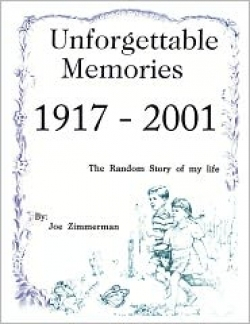Unforgettable Memories 1917-2001
The Random Story of My Life in Bits and Pieces
Joe Zimmerman began to write his autobiography at the age of seventy-eight. He tells his life story in a simple way and, in the process, provides a cultural history of the twentieth century.
He was born at home in rural Indiana in 1917 to a mother who had six other children within a ten-year stretch. His early memories are those of a child who did not know his family was poor. For what he describes as the “unforgettable Christmas” of 1927, Zimmerman and his siblings each received one orange and four walnuts in their Christmas stockings. After completing eighth grade, he quit school to join the work force.
The author came of age during the Great Depression and it is Zimmerman’s memories of the Depression that make his memoir come alive. When Zimmerman asked his boss for a day off to get married, his boss told him that he couldn’t afford to get married. Of course, the wedding took place despite his boss’ advice.
The author’s insights into how financial disaster changed American culture lend gravitas to the book. Through his eyes, the reader sees Franklin Delano Roosevelt as a savior. When the president’s plane flew over Zimmerman’s hometown of Gary, Indiana, “Church bells rang, whistles blew, and people were standing on top of their houses waving flags.” Zimmerman credits the deprivations of the Great Depression with the country’s almost desperate devotion to the emerging entertainment industry. “The radio sitcoms, the romantic, comedic movies, and the wonderful music of the big bands simply inundated the entire nation with laughter, music and romance. For a nickel, or a dime, you could to a go a movie and see it two or three times if you wanted to.”
Unforgettable Memories mirrors the culture throughout the proceeding decades. Zimmerman’s wife quits her job as a nurse to raise their two adopted daughters, and she goes back to work to put them through college. The couple retires and celebrates their fiftieth wedding anniversary.
While grammatically correct, the author’s writing style is not inspiring. His characters are poorly defined and uninteresting. The book’s conclusion is mildly unexpected, but does not rise to the level of memorable.
In perhaps the most insightful observation of the book, the author credits the misery of the era with the concept of romantic love in America. “I think the 30s and 40s were probably the most romantic era in our nation’s history. The entertainment media did a fantastic hard sell on romance.” To illustrate his point, Zimmerman writes, “There was one line from one of the most popular songs of the day that said it all…, ‘The moon belongs to everyone, the best things in life are free.’”
Reviewed by
Marilyn Berry
Disclosure: This article is not an endorsement, but a review. The publisher of this book provided free copies of the book and paid a small fee to have their book reviewed by a professional reviewer. Foreword Reviews and Clarion Reviews make no guarantee that the publisher will receive a positive review. Foreword Magazine, Inc. is disclosing this in accordance with the Federal Trade Commission’s 16 CFR, Part 255.

